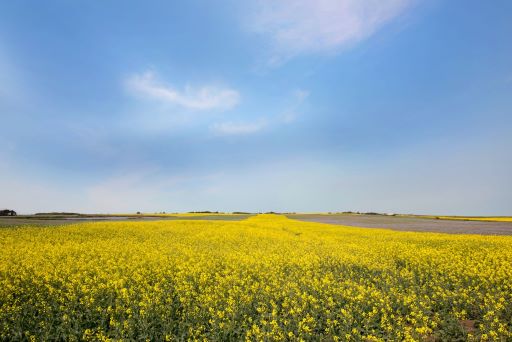Released on July 23, 2020
Crops remain in relatively good condition and are advancing quickly, thanks to recent rain and warm weather.
Provincially, 89 per cent of fall cereals, 77 per cent of spring cereals, 74 per cent of oilseeds and 84 per cent of pulse crops are at their normal stages of development for this time of year. With further hot temperatures in the forecast, many crops are expected to quickly catch up. Some crops in southern areas are beginning to dry-down and local producers expect harvest operations to begin in the coming weeks.
Rainfall varied throughout the province this past week with many regions receiving at least half an inch. The Kuroki area in the east central region received the greatest amount of rainfall with 51 mm.

Cropland topsoil moisture is rated as four per cent surplus, 84 per cent adequate, 11 per cent short and one per cent very short. Hay and pasture land topsoil moisture is rated as three per cent surplus, 74 per cent adequate, 18 per cent short and five per cent very short.
Haying continues in between rain showers, although frequent rain and high humidity has prevented dry-down of many hay crops. Livestock producers now have 22 per cent of the hay crop cut and 20 per cent baled or put into silage. Hay quality is currently rated as 10 per cent excellent, 65 per cent good, 18 per cent fair and seven per cent poor.
Hay yields have been below normal for many producers and most are unsure if a second cut is possible this year. Estimated average dryland hay yields at this time are 1.3 tons per acre for alfalfa, 1.2 tons per acre for alfalfa/bromegrass, 1.0 tons per acre for other tame hay, 0.8 tons per acre for wild hay and 1.8 tons per acre for greenfeed. Estimated average irrigated hay yields are 2.4 tons per acre for alfalfa, 2.5 tons per acre for alfalfa/bromegrass and 2.0 tons per acre for greenfeed.
Crop damage this past week was attributed to localized flooding, hail, strong winds and lack of moisture. Diseases such as root rot, ascochyta and other leaf spots are being scouted while insects such as grasshoppers are being sprayed. Many producers continue to spray fungicides on crops as weather and field conditions permit.
Farmers are busy haying, applying fungicides, scouting for disease and insects and getting equipment ready for harvest.
A complete, printable version of the Crop Report is available online at https://www.saskatchewan.ca/crop-report.
Follow the 2020 Crop Report on Twitter at @SKAgriculture.
-30-
For more information, contact:
Shannon Friesen
Agriculture
Moose Jaw
Phone: 306-694-3592
Email: shannon.friesen@gov.sk.ca

